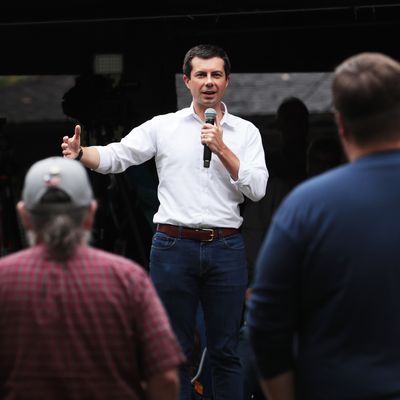
Last Saturday, as on most late-summer/autumn Saturdays, my wife and I were focused to the exclusion of all else on a football game between our alma mater, the University of Georgia, and the University of Notre Dame, a school located in Mayor Pete Buttigieg’s South Bend, Indiana. During the game we joined hundreds of thousands of UGA fans in spending the better part of three and a half hours howling atavistically at the Fighting Irish in hopes of creating psychic interference with their execution of plays (it worked pretty well), when we weren’t making barking sounds in appreciation of our own gridiron heroes.
In other words, you could say I’m a serious college-football fan. And in that capacity, I want to talk about what Mayor Pete said to reporter Ben Jacobs about his own misgivings about the sport:
Presidential hopeful Pete Buttigieg said he had moral qualms about being a college football fan and found it “problematic” on Monday.
In response to a question from Jewish Insider about the issues with following a sport where unpaid athletes risk serious injury, Buttigieg said, “First, you need to look at what we owe students. Obviously the model says you get an education in exchange for contributing this way, plus the sport is supposed to be its own reward, but I don’t think that that’s really fair anymore….”
Speaking earlier Monday on his campaign bus, Buttigieg said that the last time he may have yelled was during the Fighting Irish’s victory over Louisville earlier this month. Buttigieg noted his view was shaped by his role as mayor of South Bend, Indiana, the home of Notre Dame. Describing the quandary, he said, “I think about it from a perspective of a city that relies on college football in the same way that Bahrain relies on fossil fuel.”
He wondered if technology might provide answers or “is the future that 40 years from now, in the best case scenario, is Notre Dame known for a world-class soccer program instead?” However, Buttigieg conceded that “it’s problematic and I don’t have a solution for it.”
Buttigieg also said that if he had a child, he “would hesitate to let them play football.”
The Week commented that Mayor Pete “may have just taken the biggest risk of his Democratic presidential campaign.”
I sincerely hope not. He was simply speaking a truth that most college-football fans know in their hearts, as my colleague Will Leitch, a fine sportswriter who covers college football often (and who hosted a big tailgate party at the UGA/Notre Dame game), recently observed in an acerbic column on Clemson’s much-praised football coach Dabo Swinney, a sanctimonious defender of the alleged “amateurism” of college sports:
As another season of college football begins — the first game, between Miami and Florida, is just ten days away, and this resident of Athens, Georgia, has been hearing Bulldogs coach Kirby Smart screaming expletives at the teenagers under Smart’s supervision on his morning run for weeks now — it is worth remembering just how increasingly difficult it can be to jump through all the ethical hoops necessary to remain a fan of the sport….
College football is a sport that brings in more than a billion dollars a year and one that is under increased public pressure to bring at least some of that money closer to the players who are putting their minds and bodies on the line for free each week. So far, that money is just going to the middle-aged, mostly white men ordering them around: Clemson itself has three assistants who make more than $1 million a year. In a sign of just how imbalanced this has become, for the first time, in 2018, college athletic spending for coaches outpaced spending on scholarships. It is the sort of factoid that gives up the game.
Leitch asked me about my own negotiation of “ethical hoops” as a football fan when I was his guest on a podcast recently, and I responded that between the head-injury issue and the ever-more-blatant exploitation of the players generating such vast revenues, I had developed the habit of renewing my fandom in one-year intervals, like a short-term contract extension. I don’t know how much longer I can continue to do that, but recognizing the sport’s realities hasn’t kept me from loving the game or my beloved Bulldogs, who provide me an emotionally powerful link with the folks back home who share none of my political or religious views. The players we adore, after all, are the victims, not the culprits, of college football’s corruption.
So Buttigieg deserves real credit, not abuse, for acknowledging his own mixed feelings about college football. Out here in California we have a governor and state legislature that have dared to defy the gods of college athletics by standing up for the right of players to control the sale of their own names, images, and likenesses. If other politicians — and fans — admit the truth, perhaps there’s hope for saving the game before it’s too late.






























